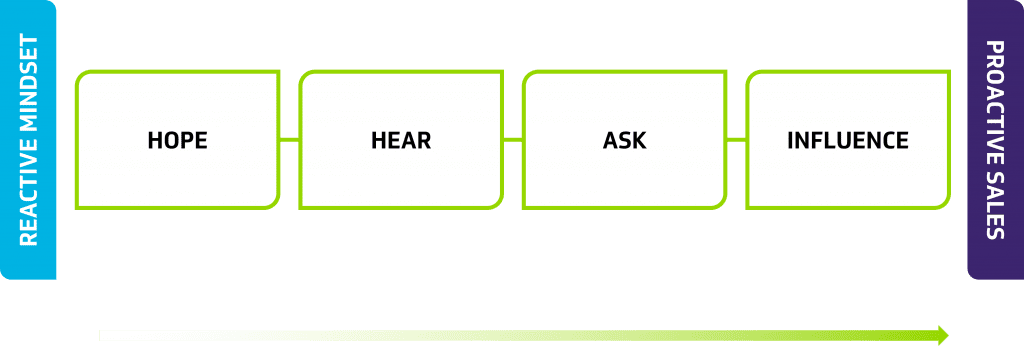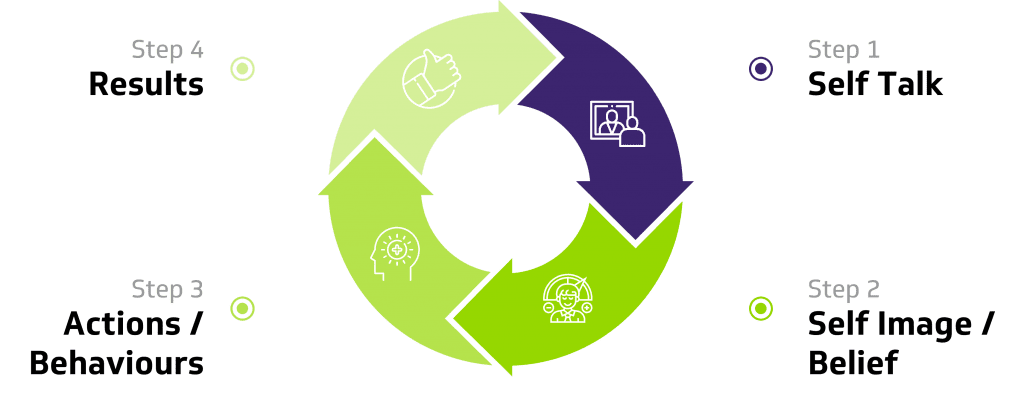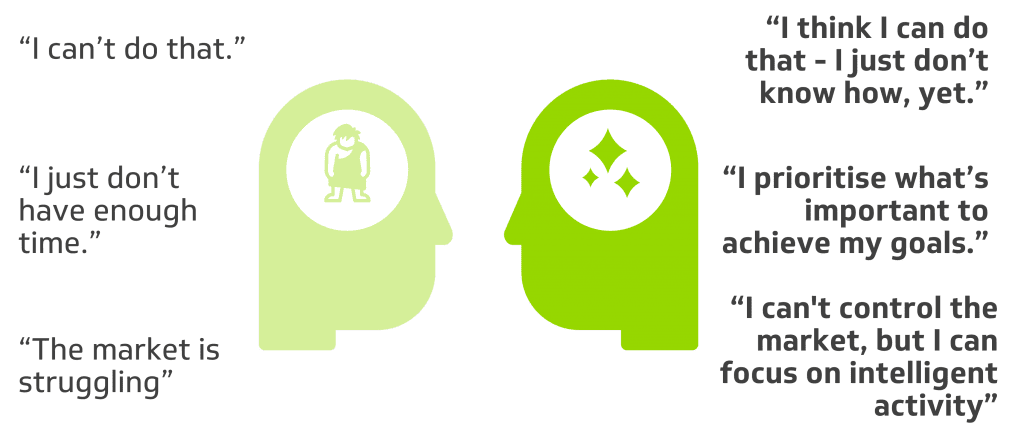Keeping a positive mindset when your firm’s not bringing in as much business as you like is tough. Especially if “sales” feels like a dirty word to you; which is certainly the case with most consultants we speak to.
So, if phrases such as “I never wanted to be in sales anyway”, “I am better when I just focus on delivering” and “Asking for business just makes me look desperate” seem familiar to you, then you’re certainly not alone. However, by adopting some of the tools and practices in this blog, you can change your approach to “sales” forever.
In this blog we discuss:
- How the ROI on your morning cup of coffee is about to massively improve
- Why ignoring your colleagues and peers is sometimes the most effective action you can take
- The importance of using the right language, especially when talking to yourself
“Hope is not a strategy”
It’s a familiar scenario for consultants. An intense 12 weeks of delivering a project, with none of the team able to focus on anything else. In the early days of business, a steady stream of referrals meant you always had the next project lined up. But as the team has grown, you’ve slipped into a cycle of boom and bust. Each quarter there’s a desperate few weeks of uncomfortable conversations and what feels like begging for business.
And it’s a common story. A 2019 study revealed that “referrals” were the primary source of new business for 37% of consultants— significantly higher than the second most popular method of winning new business, through networking and events (18%).
In our view, relying on referrals is akin to keeping your fingers crossed as a business development strategy. This is why you need to take a more proactive approach to sales, rather than “hoping” for the next referral to drop into your inbox.
A consultative approach to sales
Business development doesn’t have to be as “salesy” as you might fear. An approach we have found works very effectively is really just an extension of consultative work.
It’s all about having your ear to the ground, and being around your prospects so you can get an understanding of the challenges and issues they are facing. This is why it’s so important, now we can do so, to get back out on client sites or proactively listen out in meetings for opportunities.
The step next is to ask. Now, we don’t mean literally asking “have you got more work for us?”
Ask at a more general level – where the business is going, are there any upcoming PESTEL (political, economic, social, technological, environmental, and legal) factors that could impact the organisation?
By getting into the habit of asking these questions, you then create opportunities to influence clients and give suggestions and ideas on how to counteract any upcoming challenges.

Creating habits that become automatic
You often hear sales is a numbers game. Our take on this is that it’s a ratio game. And as the adage goes, “if you don’t make the calls, you don’t make the sales”. However, as we have mentioned, often consultants would rather take part in Squid Games than pick up the phone or send an email.
And it’s easy to come up with reasons not to – whether that’s you don’t have the time, or it just makes you feel uncomfortable.
However, the more we do things that make us uncomfortable, the easier they become. So, you need to get into the habit of sending those emails, direct messages, or making those calls. This is because the best salespeople aren’t necessarily the most persuasive, they are the most consistent.
For example, despite decades of sales experience, our co-managing director Stuart Lotherington, regimentally reaches out to prospects every day. This could be sharing an article he feels is relevant to a particular client or prospect or just checking in.
He says: “One of the things that have helped me as far as my career in consulting is that I take an approach of doing four reaches a day. I’m still carving out 15 minutes a day, which to me is as essential as having a meal or going to bed and sleeping as essential as that I’m reaching out to clients.”
So, when does Stuart find the time to do this?
He says: “I can do that on a train. I could do it on a plane. I could do it during that dead time that we have going to and from client sites, as much as being able to do it at my desk. There really is an excuse to not do four reaches a day.
“Now, what I know, is that as a result of four outreaches a day, I consistently produce 10 client meetings a month. And I know that on average, a percentage of those meetings will result in new work. All from four reaches a day.”
An effective way of creating a habit like this is through what’s known as habit stacking. For example, you may already spend 15 minutes scrolling through social media or the news while drinking your morning coffee. By replacing the scrolling habit with an outreach habit, you are stacking that on an existing habit.
You may have also heard of the theory of “eating the frog”. By doing the task we most dread first thing in the morning, our day can only improve. And getting that task out of the way also helps build our confidence.
And after a few weeks of sending four reaches with your morning coffee, it’ll become a habit that you do without thinking. So, if you are able to double the number of client meetings with this approach, how would that translate to new business? As we mentioned, quite an ROI on your morning coffee!
Building mental toughness
Another habit that can help you master business development is catching and managing negative self-talk. You may have noticed that the best salespeople are also quite confident. But are they confident because they win a lot of business, or do they win a lot of business because they are confident?
Well, the answer is both. However, we get a better idea of who is more effective when things aren’t going well. Because the truth is, many of us get our confidence from results. This triggers positive self-talk and a self-image of confidence and the cycle continues.

However, the most effective salespeople are those that can produce positive self-talk and ultimately results, when the environment isn’t great.
So, what steps can you take to improve self-talk?
It’s all about reframing your internal monologue and focussing on the process rather than the results.
For example, rather than telling yourself that you’re no good at business development, you should reframe that as “I’m becoming better at business development”.
Rather than thinking, “I’m no good at business development because I’ve had three unsuccessful pitches” look at that as:
- “I’m becoming better at business development because I follow up every lead.”
- “I’m becoming better at business development because I have more one-to-one meetings with my clients.”
- “I’m becoming better at business development because I make sure I have coffee meetings with my prospects or clients and find out and uncover more.”
This is a very important habit to build – not just reframing the situation but also finding three learnings or positives from the situation. So, every time you have a setback try and find three learnings to turn a negative situation into a more positive one.

Ignoring the noise
As well as battling our own negative self-talk, we often have to put up with negative noise from other sources. This could be colleagues, competitors, and even the media. For example, how often do we hear that there’s no point in reaching out to clients in August because they’re ALL on holiday? And how does it affect your motivation? Or how do you feel when every front page warns of an upcoming recession?
The fact is there are many things in life (whether that’s the economy or Covid) that we can’t control. However, what we can control is our four reaches a day. So, when the economic doom-mongers gather, focus on what is under your control or you have an influence on. For example, what you can control is increasing that to five or six reaches a day.
As Einstein famously, said, “Insanity is doing the same thing over and over and expecting different results.” In short, you have to adapt your actions to the environment. If four outreaches a day results in 10 meetings a month during a period of growth, you can’t expect the same results during a downturn.
In conclusion
As we have mentioned consistency is the most important factor in business development. By taking small daily and weekly actions, you will build up a sustainable flow of business. And by building these habits you’ll develop the discipline to continue sales activity, even when business is going well, to eradicate the cycle of boom and bust.
If you would like to discuss more about improving your emotional resilience, please get in touch by emailing info@sbrconsulting.com or call us on +44 (0) 207 653 3740.
You can sign up to receive regular updates and join over 4,000 others who enjoy access to our unique research insights, expert guidance, and advice.